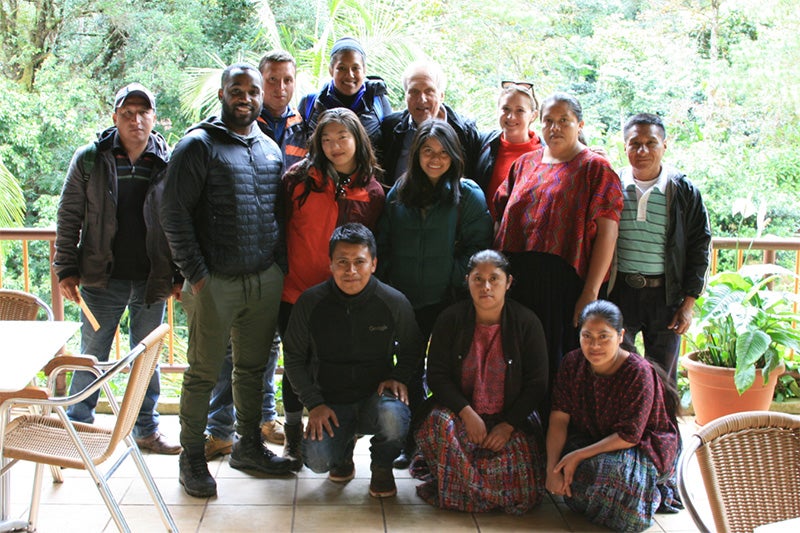Economic Empowerment for Poor Communities in Guatemala’s Coffee-Rich Regions
Economic Empowerment for Poor Communities in Guatemala’s Coffee-Rich Regions

The team’s Candace Parker (’19), Helena Hong (’19), Ellen Woodcock (’19), Estefi Medina (’19) and Jason Cole (’19) met with children in Cojaj, Alta Verapaz, Guatemala | The team interviewed Mercedes and Hilma, two of SID’s program beneficiaries and promoters.
What is international development? It is work focused on solving a range of difficult social and economic issues related to poverty, malnutrition, education, health care and human rights. Strategies for International Development (SID) is a global nonprofit organization that helps farmers in Central America lift themselves from poverty by helping them build successful farm businesses that increase their income. This includes conserving the natural resources upon which their agro-businesses depend and helping women play an equal role in building these businesses. SID has established a presence in Bolivia, Peru and now Guatemala, where the coffee industry is a key component of Guatemala’s economy.
At the beginning of 2019, our Applied Management Research (AMR) team embarked on a trip to Guatemala to get a bird’s-eye view of how SID implemented its practices into rural indigenous communities with the goal of helping them rise up from poverty. On this trip, we sought to better understand SID’s product by evaluating its regional approach, its technical assistance concept and the potential of the women’s program in a new region; conducting interviews with SID’s on-site team in Guatemala and the beneficiaries of SID’s programs; and collecting marketing assets showcasing SID’s core pillars and success stories. This trip allowed us to create a marketing strategy and implementation plan to assist SID in attracting interest from potential donors as well as donor/partner segmentation and positioning.

UCLA Anderson MBA students on the SID team visited Finca Aurora in Santa Cruz, Alta Verapaz, Guatemala.
Prior to our visit to Guatemala, our team conducted weeks of extensive secondary research on Guatemala’s coffee industry, giving us a better understand of the farming landscape and the challenges with current farming practices, which better prepared us to interview farmers on our visit. From January 5 to January 11, the team embarked on a journey to two rural communities in Guatemala outside of the municipality of Carchá: Cojaj and Tipulcan. We spent our first three days attending two community workshops, two women’s leadership workshops and one community husking demonstration fair. While in the rural villages of Cojaj and Tipulcan, our team also conducted video interviews with SID’s program beneficiaries and on-site Guatemala staff. We spent our fourth day debriefing the SID team on the week’s activities while also discussing potential program improvements based gleaned from our observations and research. We concluded the day touring Finca Aurora in Santa Cruz to see a highly profitable and environmentally sustainable end-to-end coffee operation in Guatemala while also participating in a coffee tasting. Throughout the week, we also immersed ourselves in the culture of Guatemala, enjoying delicious meals and high-quality coffee while interacting with children and adults alike.
Our team returned from the trip with three key takeaways:
- 1. SID needs to more effectively promote its regional program, through both external marketing materials (e.g., website) and donor-specific proposals and pitches.
- 2. We now have a better understanding of SID’s “solution to the problem,” which will assist us with SID’s marketing strategy and positioning.
- 3. SID’s seven innovations can be condensed to five key pillars — scale for impact, business planning, women’s empowerment, environmental sustainability, community leadership — to better tell its story.
This trip was extremely valuable, as we now have a clear picture of the value that SID offers these communities a better understanding of how we can help our client. The AMR field study was a once-in-a-lifetime experience that we will all cherish deeply as we positively impact these rural communities and continue to build connections there.
UCLA Anderson MBA students conduct Applied Management Research (AMR) projects in lieu of a thesis. The nation’s first business school field study program, AMR partners students with top organizations to solve a key strategic problem. The Center for Global Management supported UCLA Anderson Class of 2019 teams to conduct critical primary research and collaborate with established NGOs seeking sustainable strategies to improve local economies, health and education outcomes, empowering local communities and developing more sustainable supply chains in environmentally sensitive parts of the world.